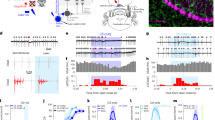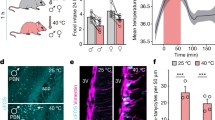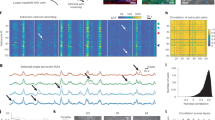Abstract
RECEPTORS for N-methyl-D-aspartate (NMDA) seem to have a critical role in synaptic plasticity1–4. NMDA antagonists (such as AP5) prevent induction of long-term potentiation5,6, an activity-dependent enhancement of synaptic efficacy mediated by neural mechanisms that might also underlie learning and memory. They also attenuate memory formation in several behavioural tasks7–17; there are few data, however, implicating an NMDA-sensitive measure of conditioning based on local infusion of antagonists into a brain area tightly coupled to the behavioural response used to assess conditioning. We now show that NMDA antagonists infused into the amygdala block the acquisition, but not the expression, of fear conditioning measured with a behavioural assay mediated by a defined neural circuit (fear-potentiation of the acoustic startle reflex). This effect showed anatomical and pharmacological specificity, and was not attributable to reduced salience of the stimuli of light or shock used in training. The data indicate that an NMDA-dependent process in the amygdala subserves associative fear conditioning.
This is a preview of subscription content, access via your institution
Access options
Subscribe to this journal
Receive 51 print issues and online access
$199.00 per year
only $3.90 per issue
Buy this article
- Purchase on Springer Link
- Instant access to full article PDF
Prices may be subject to local taxes which are calculated during checkout
Similar content being viewed by others
References
Collingridge, G. L. & Bliss, T. V. P. Trends Neurosci. 10, 288–293 (1987).
Artola, A. & Singer, W. Nature 330, 649–652 (1987).
Cline, H. T., Debski, E. A. & Constantine-Patton, M. Proc. natn. Acad. Sci. U.S.A. 84, 4342–4345 (1987).
Kleinschmidt, A. Bear, M. F. & Singer, W. Science 238, 355–358 (1987).
Collingridge, G. L., Kehl, S. J. & McLennan, H. J. Physiol., Lond. 334, 33–46 (1983).
Cotman, C. W., Monaghan, D. T. & Ganong, A. H. A. Rev. Neurosci. 11, 61–80 (1988).
Morris, R. G. M., Anderson, E., Lynch, G. S. & Baudry, M. Nature 319, 774–776 (1986).
Morris, R. G. M., J. Neurosci. 9, 3040–3057 (1989).
Benvenga, M. J. & Spaulding, T. C. Pharmacol. Biochem. Behav. 30, 205–207 (1988).
Butelman, E. R., Pharmacol. Biochem. Behav. 34, 13–16 (1988).
Danysz, W. & Wroblewski, J. T. Neurosci. Res. Commun. 5, 9–18 (1989).
Danysz, W., Wroblewski, J. T. & Costa, E. Neuropharmacology 27, 653–656 (1988).
Staubli, U., Thibault, O., Lorenzo, M. & Lynch, G. S. Behav. Neurosci. 103, 54–60 (1989).
Robinson, G. S., Crooks, G. B., Shinkman, P. G. & Gallagher, M. Psychobiology 17, 156–164 (1989).
Tan, S., Kirk, R. C., Abraham, W. C., & McNaughton, N. Psychopharmacology 98, 556–560 (1989).
Mondadori, C., Weiskrantz, L., Buerki, H., Petschke, F. & Fagg, G. E. Exp Brain Res. 75, 449–456 (1989)
Hauber, W. & Schmidt, W. J. J. neural Transm. 78, 29–41 (1989)
Davis, M., Gendelman, D. S., Tischler, M. D. & Gendelman, P. M. J. Neurosci. 2, 791–805 (1982).
Rosen, J. B., Hitchcock, J. M., Sananes, C. B., Miserendino, M. J. D. & Davis, M. Behav. Neurosci. (in the press).
Hitchcock, J. M. & Davis, M. Behav. Neurosci. 100, 11–22 (1986).
Hitchcock, J. M., Sananes, C. B. & Davis, M. Behav. Neurosci. 103, 509–518 (1989).
Rosen, J. B. & Davis, M. Behav. Neurosci. 102, 195–202 (1988).
Cotman, C. W., Monaghan, D. T., Otterson, O. P. & Storm-Mathisen, J. Trends Neurosci. 10, 273–280 (1987).
Thompson, R. F. et al., in Classical Conditioning III. Behavioral, Neurophysiological and Neurochemical Studies in the Rabbit (eds Gormezano, I. Prokasy, W. F. & Thompson, R. F.) (Erlbaum, Hillsdale, New Jersey, 1987).
Liang, K. C., Juler, R. G. & McGaugh, J. L. Brain Res. 368, 125–133 (1986).
Weiner, N. in The Pharmacological Basis of Therapeutics (eds Gilman, A. G., Goodman, L. S., Rall, T. W. & Murad, F.) (Macmillan, New York, 1985).
Chapman, P. F. & Brown, T. H. Soc. Neurosci. Abstr. 14, 566 (1988).
Cassella, J. V. & Davis, M. Physiol. Behav. 36, 377–383 (1986).
Kehne, J. H. Cassella, J. V. & Davis, M. Psychopharmacology 94, 8–13 (1988).
Author information
Authors and Affiliations
Rights and permissions
About this article
Cite this article
Miserendino, M., Sananes, C., Melia, K. et al. Blocking of acquisition but not expression of conditioned fear-potentiated startle by NMDA antagonists in the amygdala. Nature 345, 716–718 (1990). https://doi.org/10.1038/345716a0
Received:
Accepted:
Issue Date:
DOI: https://doi.org/10.1038/345716a0
This article is cited by
-
Amygdala GluN2B-NMDAR dysfunction is critical in abnormal aggression of neurodevelopmental origin induced by St8sia2 deficiency
Molecular Psychiatry (2020)
-
d-Serine as the gatekeeper of NMDA receptor activity: implications for the pharmacologic management of anxiety disorders
Translational Psychiatry (2020)
-
The unique expression profile of FAM19A1 in the mouse brain and its association with hyperactivity, long-term memory and fear acquisition
Scientific Reports (2020)
-
Mechanisms of fear learning and extinction: synaptic plasticity–fear memory connection
Psychopharmacology (2019)
-
PSD95 and nNOS interaction as a novel molecular target to modulate conditioned fear: relevance to PTSD
Translational Psychiatry (2018)
Comments
By submitting a comment you agree to abide by our Terms and Community Guidelines. If you find something abusive or that does not comply with our terms or guidelines please flag it as inappropriate.



